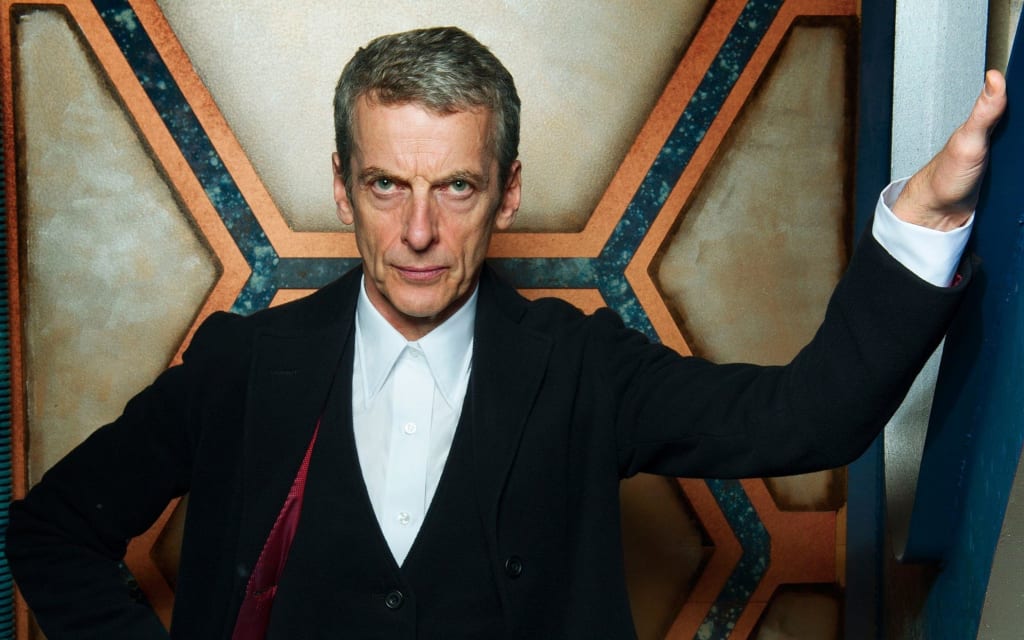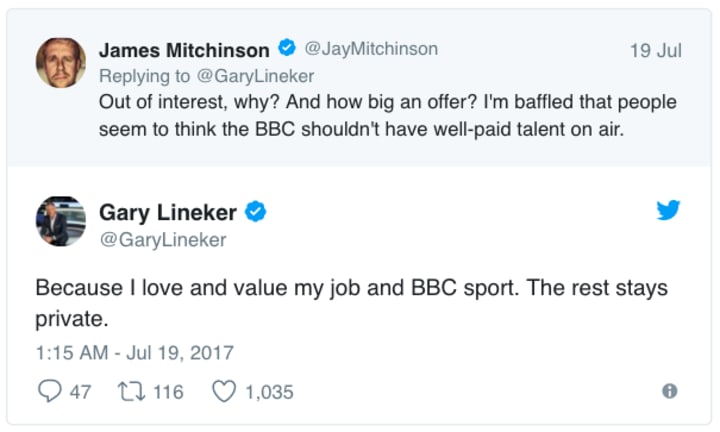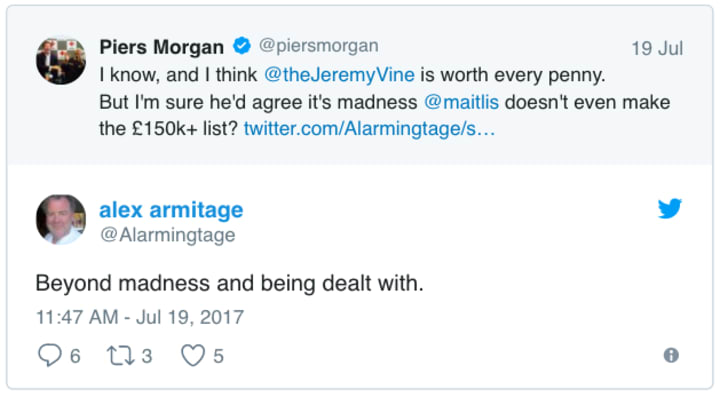
Just how much is a celebrity worth? We've seen heated debate over celebrity pay over the last couple of years, especially in light of the gender pay gap between men and women in Hollywood. The last few days, though, have seen the UK embroiled in a similar debate, after the BBC disclosed details of their 96 employees who earn more than £150,000 a year. From Doctor Who to Strictly Come Dancing, the pay details have given us a window into a world that's a lot more unequal than we had ever realized.
What's Going On?
The BBC is very different to any media agency in the US. It's State-owned, and has a responsibility for impartiality in matters of politics; as a result, it often comes under fire from both the political Right and Left. The UK pays for the BBC through a universal licence fee. If you own a TV, you are required to purchase an annual TV licence, and that money goes straight to the BBC. The licence fee is one of the BBC's biggest sources of income, although most UK citizens tend to forget that it also makes a lot through global distribution of BBC shows like Doctor Who.
Still, the license fee means that the media in Britain doesn't work on a level playing field. The BBC's commercial rivals, for example, depend on commercials to get things done. Unfortunately for the BBC being commercial-free also comes which disadvantages, including intense political pressure from time to time. The Conservative Government, for example, has mandated that the BBC release pay details of anybody who is directly paid more than £150,000 a year.
Exposing Some Very Real Issues
According to the BBC, 96 stars earn more than £150,000 — and there's a glaring gender gap, with 62 men and only 34 women. The gap was most visible among the presenters on The Antiques Road Show, with Huw Edwards paid £550,000-£599,999, and co-presenter Fiona Bruce earning £200,000 less.
Radio 2 DJ Chris Evans is the highest-paid star, paid between £2,200,000-£2,249,999 — it's thought that also represents his stint as a presenter on Top Gear, although the BBC hasn't provided an in-depth breakdown of where the pay came from. In contrast, Strictly Come Dancing presenter Claudia Winkleman is the highest-paid woman, earning £450,000 – £499,000. She comes in eighth in terms of the BBC's top earners.
BBC Director General Lord Tony Hall has admitted that the figures show a 10% pay gap between men and women, and has resolved to close that gap by 2020. At the same time, though, he's also strongly defended the BBC by arguing UK society as a whole currently has a pay gap of 18%.
Pleasingly, Lord Hall has confirmed that Jodie Whittaker, the first female star of Doctor Who, will be paid the same as her predecessor, Peter Capaldi. He made the list, earning £200,000-£249,999.
Why Is This Debate Happening?
So why does the BBC have to make this information public? Simply put: politics. There are influential groups among the Conservative Party who are ideologically opposed to the idea of a State broadcaster like the BBC. Meanwhile, the Conservatives are strongly associated with Murdoch press empire, who are one of the BBC's main rivals. With the country still struggling to recover from seven years of austerity politics, pay packets like Chris Evans's £2.2 million seem obscene to the man on the street. Given the BBC's revenue is funded in part by universal license fees, there's growing political pressure to do something.
Conservative MP John Whittingdale, who as former Culture Secretary insisted on pay being made public like this, explained:
“I felt – and the Government felt at the time – that this is public money and if somebody is earning the equivalent of 1,000 households’ licence fees put together, then the licence fee payer deserves to know about that and reach a judgment for themselves of whether that is good value for money.”
Ironically enough, the debate surrounding the pay disclosure has hammered home that the commercially funded channels actually pay their stars vastly more than the BBC. Sports presenter Gary Lineker, for example, comes second on the BBC's list of top earners, taking home £1,750,000-£1,799,999. As he's pointed out, the BBC's commercial rivals have approached him with tempting pay offers far better than anything the BBC would present:

He's undoubtedly telling the truth. Lineker's fellow sports pundit Thierry Henry joined Sky back in 2014, and it's believed they offered him a staggering £24 million. There are some reports Henry is still earning over £4 million a year over at Sky, which is over three times Lineker's pay. It's generally believed the top earners over on ITV, a major commercial broadcaster in the UK, are Ant and Dec. Last year, the two presenters signed a three-year deal that nets them £5 million each every year.
And this brings us to the heart of the political issue; this is essentially an opportunity for the BBC's rivals. In comparison to other broadcasters, the BBC has always been uncompetitive in terms of pay. Now pay details are becoming public, the broadcaster is under political pressure to cut pay even more, even as its staff will spot the inequalities, and want to be better paid.
Take the example of Emily Maitlis, a Newsnight presenter whose name doesn't feature on the list. She's currently out of contract and in negotiations, and the revelation that her fellow Newsnight presenter earns up to £299,000 a year has clearly incensed her. Her agent has already publicly tweeted his attitude to this:

Ultimately, the stars who work for the BBC know what they're worth. They know that they're already effectively taking a pay cut in order to work for the public service broadcaster. But at what point does a message of inequality undermine the ethos that is supposed to be at the heart of the BBC? That's the question facing the broadcaster, and every one of its stars — not just the top-paid talent — will have to make up their own mind on the matter. Against this backdrop, the BBC's competitors now know just how much to offer in order to tempt anyone to switch channels, and in political terms, it's hard to see this as anything other than a concerted attempt to make the BBC less competitive in the market. Naturally, the press are piling on the pressure. The Murdoch press in particular is reveling in this opportunity, especially with Murdoch's current plans to expand his media empire in the UK.
We're entering a new age for the British media. The British government has forced the BBC to publish its top pay details, and there are hints they may continue to pile on the pressure. On the one hand, these disclosures have given us a window into a very real inequality in the UK. On the other, though, they've transformed the media landscape. It's hard to see them accomplishing anything other than leaving the BBC less competitive, and allowing their commercial rivals to thrive.
(Sources: Bleacher Report, Daily Express, The Guardian, The Sun)
About the Creator
Tom Bacon
A prolific writer and film fan, Tom has a deep love of the superhero genre.






Comments
There are no comments for this story
Be the first to respond and start the conversation.